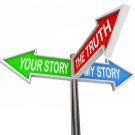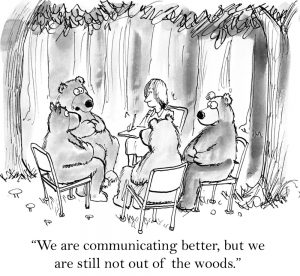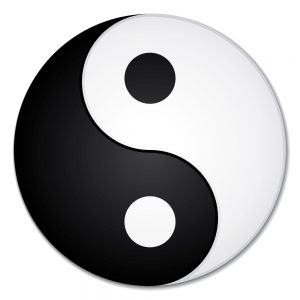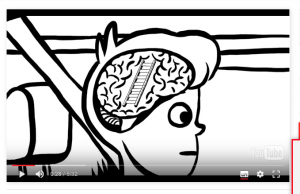Is it Really “Common Sense”?

When I hear the phrase “It’s just common sense”, I cringe.
Why? Because our version of “common sense” is based on our environment and past experiences. What might be common sense to an American, can be very different than what is considered common sense to someone born in a different culture.
Case in point:
In America, smiling at people is considered a friendly way to acknowledge them. In Russia however (and other cultures), smiling is not encouraged! Because of the corruption and instability, smiling is deemed as untrustworthy! In fact there is a Russian proverb that roughly translates to “laughing for no reason is a sign of stupidity.”!
Our truths are shaped by our experiences. And our truth can change as we are exposed to new perspectives.
The podcast Invisibilia tells the story of how people’s attitude towards bears divided the town. A wildlife biologist believed that bears weren’t dangerous, and he interacted with them regularly. He believed that if you treat them nicely, they will feel safe with you, and have no interest in hurting you. He regularly fed them by hand and would sit with them on the porch! He introduced other members of the town to this idea, and some who had previously believed that bears were dangerous began to feel a connection to the bears. The bears in turn felt safer around the people, and started coming around more to their houses and interacting with the people.
 But there were others in the town that still believed that bears were dangerous, and were not open to a different perspective. To them, it was common sense that bears are dangerous. They took steps to remove the bears from the town, much to the dismay of those that had grown attached to them.
But there were others in the town that still believed that bears were dangerous, and were not open to a different perspective. To them, it was common sense that bears are dangerous. They took steps to remove the bears from the town, much to the dismay of those that had grown attached to them.
There was conflict between those that insisted bears that were dangerous, and those that insisted that they were like any other animal.
Another example of this lies with the struggle I have of “resting bitch face”. This means that regardless of whether we are upset, we can be perceived by others to be in a bitchy mood. More than once, people have asked me what is wrong, when I wasn’t thinking about anything distressing. People have bugged me to admit what was on my mind, and when I can’t come up with anything upsetting, I can see that they don’t trust me. This disturbs me tremendously because my integrity and trustworthiness is something I value highly about myself. Their experience leads them to interpret a truth that is different from my own.
Many of us have a hard time accepting that “the truth” is actually a story we put together based on our experiences. We believe that there should only be one truth, and we are constantly fighting to defend our truth in courts and it politics.
But there are other ways to think about the truth.
Our perception of the truth is based on our Ladder of Inference, a concept proposed by Harvard Scientist Chris Argyris. There are many steps that we take to compose our version of the truth. To interpret what we’ve experienced, we create stories based on our past, filtering in only the information that is consistent with how we see the world. Check out the different steps we take to reach our truth in this TED-ex video here.
The Taoist concept of Yin and Yang is the idea that there is a duality to everything. There is a good and bad, and light and a dark, and that they are intertwined. And in yin, there is an element of yang, and in the yang, there is an element of yin.
What would happen if we all realized our own truths were biased? What would happen if we could accept the idea that nothing is absolute?
I admit that I struggle with this idea. As a trained scientist, we dedicate our lives to discovering the truth by taking careful measures to be objective as possible. We are taught to back our claims with evidence, and to not lie or exaggerate. So can the truth of a scientist who has taken the time to gather evidence and who’s writings have been subject to pier review, be equally valid as someone who makes something up to distort the facts?
No!
But what I do know is that even in science, our truth changes with more evidence. What is true consistently evolves. It doesn’t stay static. The more we know, the more evidence we see, the closer to the truth we will get.
Imagine if we encounter someone else with a completely different truth. If we can accept the notion that our truths are based on our experiences, and stay open to the possibility that our truth can change, we might find that our lives become less contentious and more harmonious.
Did you like this article? Please click the links below to share it with your friends!




